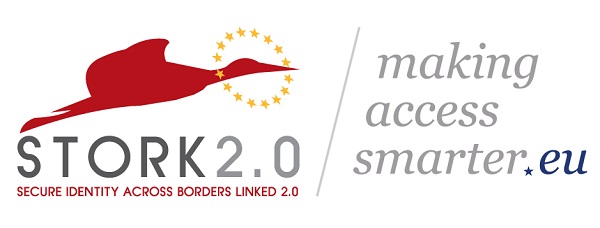
Four pilots to improve online eLearning, eBanking, eGov4Business and eHealth services across Europe
STORK 2.0 (Secure idenTity acrOss boRders linKed 2.0), a project working towards the creation of a single framework and infrastructure for cross-border electronic identification and authentication (eID) in the EU and Associated Countries, today announced the launch of the real-life pilots eLearning Qualifications, eBanking, Public Services for Business and eHealth. These services are aligned with the objective of STORK 2.0 to improve the access and use of public and private cross-border online services for citizens living, working and studying anywhere in the EU.
Alberto Crespo, STORK 2.0 pilots coordinator, commented on their significance: “The launching of pilots in such areas represents a major milestone in the achievements of STORK 2.0 project, bringing us one step closer to materialising interoperability at various levels (technical, semantic, legal, organisational), thus enabling secure electronic identification authentication of European citizens across borders also as legally mandated representatives of other legal or physical persons”.
eLearning and Academic Qualifications – Facilitating cross-border academic service
The eAcademia pilot aims to create an advanced cross-border eLearning environment through services such as shared eLearning environments for joint degrees and eSurveys. It will also all allow academic qualifications to be made accessible to both private and public institutions while ensuring that citizens’ rights are safeguarded.
Vicente Andreu Navarro, the eAcademia pilot leader, stated “We will be working with students, graduates, alumni, professors and staff at participating universities to introduce eLearning degree courses, as well as an academic attribute verification service that will enable job applicants from anywhere in the EU to prove they have the required academic qualifications for employment.”
eBanking – Establishing cross-border online eBanking services using eID
This pilot introduces a range of pan-European online banking services accessible via national eIDs. It allows citizen and small businesses to open bank accounts securely, online and across borders, helping to establish the digital single market. It also adds confidence in international e-invoicing by enhancement (with data enrichment and legal mandates) and validation (of STORK 2.0 signatures and certificates).
Eric Smith, the eBanking pilot leader, claimed “Online and mobile banking are now the methods of choice for many Europeans. The introduction of eID for logon and new account opening across borders gives real advantages to today’s geographically diverse population. We are very pleased to announce that since the 23rd of September Austrian citizens can open a bank account in Slovenia at the DIBA online bank. Since June, Austrian citizens can open demonstration accounts at Arion bank in Iceland.”
Public Services for Business – Extend existing online Public Services for Businesses beyond national borders using eID
Businesses dealing with public administrations in other countries should be able to access on-line eGovernment services as easily as domestic businesses. This requires that a business person's credentials - both personal identity information and the powers to legally represent a business - be made available to and be accepted by the foreign eGovernment Service Provider. STORK 2.0 has implemented the eID infrastructure which provides such cross-border interoperability for a series of pilot services.
eHealth – Adapt or extend existing eHealth Services using eID for patients and healthcare professionals
The aim of this pilot is to use eID authentication in order to provide patients and health-care professionals with the ability to securely access electronic health records online regardless of location and in compliance with the recent EU Directive 2011/24/EU on the application of patients’ rights in cross-border healthcare as well as to the Data Protection Directive, which generally constitutes the right for individuals to have access to their personal health data.
Mr Crespo added “The pilots will help validate and improve in real-life situations (such as certifying academic attributes to access a foreign virtual course or apply for a job, opening and accessing a bank account in a foreign country, perform administrative procedures allowing companies to access foreign markets or establish a branch abroad or accessing an medical data in a foreign country) several aspects of the STORK 2.0 common infrastructure and specifications, including the cross-border use of mandates, the retrieval and management of complex attributes sets from multiple attribute sources covered by an innovative Attribute Quality Authentication Assurance (AQAA) framework or the creation and validation of electronic signatures in standardised formats.”
STORK 2.0 is an EU co-funded project under the ICT Policy Support Programme (ICT PSP) of the Competitiveness and Innovation Framework Programme (CIP). STORK 2.0 involves directly 19 countries in the Consortium (Austria, Belgium, Czech Republic, Estonia, France, Greece, Iceland, Italy, Lithuania, Luxembourg, Netherlands, Portugal, Slovenia, Slovakia, Spain, Sweden, Switzerland, Turkey and the United Kingdom) in which participate 58 partners in total.








